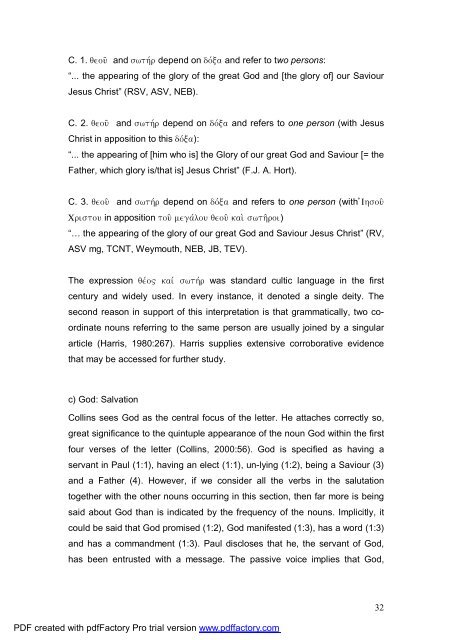A Text centred rhetorical analysis of Paul's Letter to Titus
A Text centred rhetorical analysis of Paul's Letter to Titus
A Text centred rhetorical analysis of Paul's Letter to Titus
You also want an ePaper? Increase the reach of your titles
YUMPU automatically turns print PDFs into web optimized ePapers that Google loves.
C. 1. qeou` and swthvr depend on dovxa and refer <strong>to</strong> two persons:<br />
“... the appearing <strong>of</strong> the glory <strong>of</strong> the great God and [the glory <strong>of</strong>] our Saviour<br />
Jesus Christ” (RSV, ASV, NEB).<br />
C. 2. qeou` and swthvr depend on dovxa and refers <strong>to</strong> one person (with Jesus<br />
Christ in apposition <strong>to</strong> this dovxa):<br />
“... the appearing <strong>of</strong> [him who is] the Glory <strong>of</strong> our great God and Saviour [= the<br />
Father, which glory is/that is] Jesus Christ” (F.J. A. Hort).<br />
C. 3. qeou` and swthvr depend on dovxa and refers <strong>to</strong> one person (with jIhsou`<br />
Cris<strong>to</strong>u in apposition <strong>to</strong>u` megavlou qeou` kai; swth`roi)<br />
“… the appearing <strong>of</strong> the glory <strong>of</strong> our great God and Saviour Jesus Christ” (RV,<br />
ASV mg, TCNT, Weymouth, NEB, JB, TEV).<br />
The expression qevo~ kaiv swthvr was standard cultic language in the first<br />
century and widely used. In every instance, it denoted a single deity. The<br />
second reason in support <strong>of</strong> this interpretation is that grammatically, two co-<br />
ordinate nouns referring <strong>to</strong> the same person are usually joined by a singular<br />
article (Harris, 1980:267). Harris supplies extensive corroborative evidence<br />
that may be accessed for further study.<br />
c) God: Salvation<br />
Collins sees God as the central focus <strong>of</strong> the letter. He attaches correctly so,<br />
great significance <strong>to</strong> the quintuple appearance <strong>of</strong> the noun God within the first<br />
four verses <strong>of</strong> the letter (Collins, 2000:56). God is specified as having a<br />
servant in Paul (1:1), having an elect (1:1), un-lying (1:2), being a Saviour (3)<br />
and a Father (4). However, if we consider all the verbs in the salutation<br />
<strong>to</strong>gether with the other nouns occurring in this section, then far more is being<br />
said about God than is indicated by the frequency <strong>of</strong> the nouns. Implicitly, it<br />
could be said that God promised (1:2), God manifested (1:3), has a word (1:3)<br />
and has a commandment (1:3). Paul discloses that he, the servant <strong>of</strong> God,<br />
has been entrusted with a message. The passive voice implies that God,<br />
PDF created with pdfFac<strong>to</strong>ry Pro trial version www.pdffac<strong>to</strong>ry.com<br />
32

















